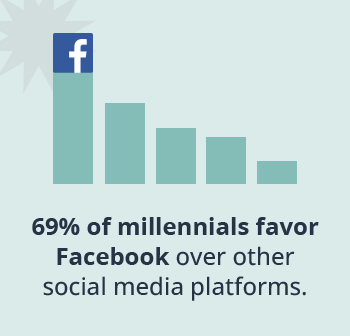As a values-focused agency we continue to wrestle with the question, “Is utilizing Facebook’s services ethical?”
We know their methods and lack of transparency have caused them to be questioned and even boycotted by brands. The pros and cons of using Facebook have therefore been heavily debated over the past few years by agencies around the world. As consumers become more concerned with a company’s business practices around sustainability, justice, and equity, marketing managers must understand how Facebook is being used in their digital marketing ecosystem.
Facebook: Still a Must-Have in Marketing
 At its core, Facebook advertising is an effective tool for promoting products and services. Facebook represents 23.7% of the overall digital advertising revenue worldwide, second only to Google at 27%. Despite the buzz around newer social media channels like TikTok, and its growth, millennials favor Facebook, with 69% of them using it compared to other social media platforms. Facebook represents a potential ad audience of 2.168 billion users all with unique needs.
At its core, Facebook advertising is an effective tool for promoting products and services. Facebook represents 23.7% of the overall digital advertising revenue worldwide, second only to Google at 27%. Despite the buzz around newer social media channels like TikTok, and its growth, millennials favor Facebook, with 69% of them using it compared to other social media platforms. Facebook represents a potential ad audience of 2.168 billion users all with unique needs.
With access to billions of users who may be interested in what a business has to offer, it cannot be ignored as a revenue source. Facebook’s ad platform offers detailed demographic and psychographic targeting, giving marketers the ability to narrow down their audience for greater efficiency and better results. Facebook’s AI-powered advertising solutions reduce obstacles and streamline the user journey, ensuring consumers reach their desired destinations with greater ease.
But, there are ethical considerations that come with using Facebook advertising.
Why is Facebook Ethically Challenging?
User Data and Control
For starters, Facebook’s data collection is so expansive that it’s often hard to know exactly what data is being collected and used to target consumers. This means that users have limited control over the ads they are seeing. While users have some control over what ads they see, and with new iOS updates, users can limit which apps they are tracked in, they have no way to completely opt out of being shown ads.
Personalization and the Rise of the Echo Chamber
Another ethical issue to consider is Facebook’s use of algorithms to personalize the ads users see. This issue is not limited to Facebook. As people start to expect a more personalized Internet experience that mirrors their interests and beliefs, we run the risk of creating a form of “Echo Chamber” marketing.
This type of marketing is like having a helpful guide that shows consumers exactly what they’re looking for. Most data tells us that online shoppers appreciate this personal touch, allowing brands to build stronger connections with their most loyal customers.
However, we are still learning the long-term effects it has on issues broader than advertising. In the pursuit of customization, we often narrow our world and cut ourselves off from a broader experience. Marketing managers should keep this in mind and determine the role their brand wants to play.

Combating False News
Facebook also has a history of allowing ads that are misleading or false to be shown to users. In the 2022 mid-term election, Facebook and TikTok failed to reject a large number of false or misleading ads while YouTube and Twitter were able to reject nearly all of them.
The failure of the platform to aggressively review and monitor misinformation creates an environment of distrust and questionable brand safety. Companies may wish to avoid that potential risk.
How Should Companies Navigate the Facebook Dilemma?
While marketing teams push for Facebook to catch up to the ethical marketing needs of consumers, there are still ways to leverage the social platform responsibly.
- Social media teams that prioritize ethical considerations in their strategies should build messaging and advertising strategies that resonate with customers. Truth in messaging and brand transparency are two key components of using Facebook ethically.
- To leverage Facebook ads ethically and responsibly, paid strategy teams should also ensure ads are not false, misleading, or otherwise against a brand’s code of ethics. Social ad strategies should also have ad frequency caps so that their customers don’t get ad fatigue. This is a sure way to lose brand affinity. Additionally, Facebook ads should be personalized and thoughtful, not spammy, loud, or intrusive.
- As a large gathering place with a lot of noise to sift through, marketing managers should do their best to leverage Facebook as a platform to promote important information that is relevant to their Facebook audience. Content teams should consider what brand messages, content, and commentary will have the most positive impact on the Facebook ecosystem as a means to promote ethical marketing on Facebook and throughout social media.
Our Ethical Marketing Initiatives
At Mad Fish Digital, ethical marketing isn’t just a policy; it’s our guiding philosophy. We’re unwavering in our commitment to ethics as we embrace change and innovation. Setting higher standards, we aim to create a more transparent and respectful digital landscape for everyone. By sharing our ethical marketing policy, we’re working towards a brighter online future.
About the Author
Corrie Herman, Co-Founder and Chief Financial Officer at Mad Fish Digital. Corrie currently holds the role of Finance and Governance Chair for the Local Portland B Corp Chapter, known as B Local PDX.

